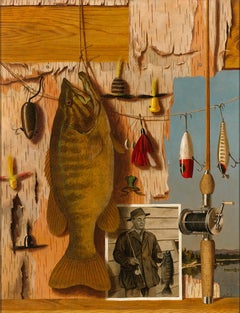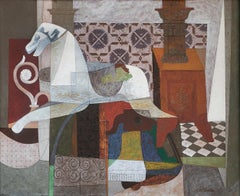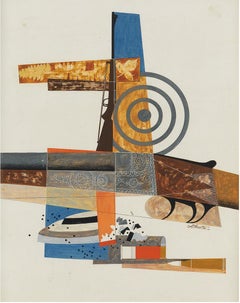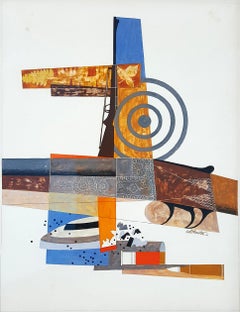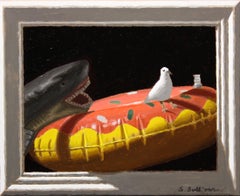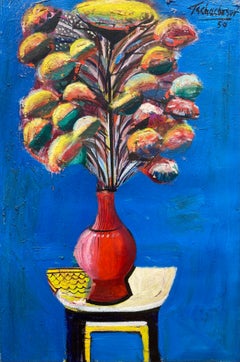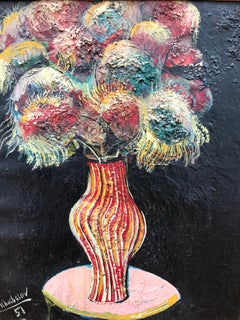Still-life Paintings
20th Century American Modern Still-life Paintings
Canvas, Oil
1940s Abstract Geometric Still-life Paintings
Gouache
1940s Abstract Still-life Paintings
Gouache, Board
1940s Post-Modern Still-life Paintings
Gouache, Board
2010s Still-life Paintings
Oil
1730s Old Masters Still-life Paintings
Oil
2010s Contemporary Still-life Paintings
Canvas, Acrylic, Gouache
2010s Abstract Expressionist Still-life Paintings
Oil, Cardboard
2010s Contemporary Still-life Paintings
Canvas, Acrylic, Gouache
2010s Contemporary Still-life Paintings
Canvas, Acrylic, Gouache
2010s Abstract Expressionist Still-life Paintings
Oil, Cardboard
2010s Contemporary Still-life Paintings
Canvas, Acrylic, Gouache
18th Century Old Masters Still-life Paintings
Oil
2010s Abstract Impressionist Still-life Paintings
Oil, Cardboard
1950s American Modern Still-life Paintings
Canvas, Oil
1950s Abstract Still-life Paintings
Paper, Watercolor, Gouache
1950s American Modern Still-life Paintings
Canvas, Oil
1950s Post-Modern Still-life Paintings
Canvas, Oil
1950s Modern Still-life Paintings
Masonite, Oil
1950s Post-Modern Still-life Paintings
Canvas, Oil
Modern Still-life Paintings
Oil, Board
Shop Still-Life Paintings on 1stDibs
Still-life paintings work as part of the decor in nearly every type of space.
Still-life art, which includes work produced in media such as painting, photography, video and more, is a popular genre in Western art. However, the depiction of still life in color goes back to Ancient Egypt, where paintings on the interior walls of tombs portrayed the objects — such as food — that a person would take into the afterlife. Ancient Greek and Roman mosaics and pottery also often depicted food. Indeed, still-life paintings frequently feature food, flowers or man-made objects. By definition, still-life art represents anything that is considered inanimate.
During the Middle Ages, the still life genre was adapted by artists who illustrated religious manuscripts. A common theme of these paintings is the reminder that life is fleeting. This is especially true of vanitas, a kind of still life with roots in the Netherlands during the 17th century, which was built on themes such as death and decay and featured skulls and objects such as rotten fruit. In northern Europe during the 1600s, painters consulted botanical texts to accurately depict the flowers and plants that were the subject of their work.
Leonardo da Vinci’s penchant for observing phenomena in nature and filling notebooks with drawings and notes helped him improve as an artist of still-life paintings. Vincent van Gogh, an artist who made a couple of the most expensive paintings ever sold, carried out rich experiments with color over the course of painting hundreds of still lifes, and we can argue that Campbell’s Soup Cans (1961–62) by Andy Warhol counts as still-life art.
While early examples were primarily figurative, you can find still lifes that belong to different schools and styles of painting, such as Cubism, Impressionism and contemporary art.
As part of the wall decor in your living room, dining room or elsewhere, a still-life painting can look sophisticated alongside your well-curated decorative objects and can help set the mood in a space.
When shopping for a still-life painting, think about how it makes you feel and how the artist chose to represent its subject. When buying any art for your home, choose pieces that you connect with. If you’re shopping online, read the description of the work to learn about the artist and check the price and shipping information. Make sure that the works you choose complement or relate to your overall theme and furniture style. Artwork can either fit into your room’s color scheme or serve as an accent piece. Introduce new textures to a space by choosing an oil still-life painting.
On 1stDibs, find a collection of still-life paintings in a wide range of styles and subject matter.
